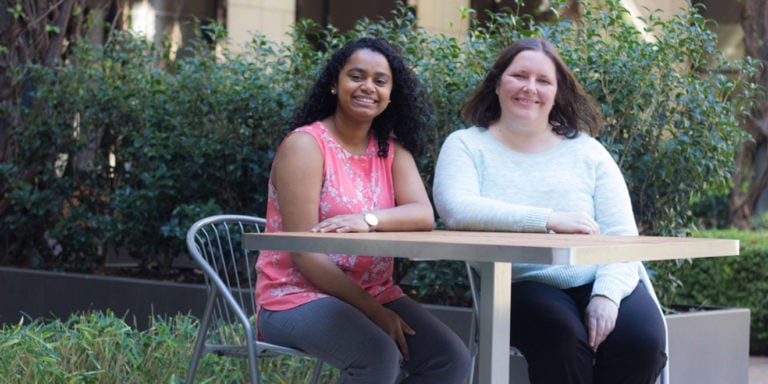This article is the second in a series examining the progress made by Associated Students of Stanford University (ASSU) elected officials, who are now halfway through their terms.
The Associated Students of Stanford University (ASSU) announced progress on the creation of a permanent Disability Community Center, on the process of updating University Title IX policy and on various other academic and housing-related objectives in a brief released Tuesday. The report, sent out by Executives Shanta Katipamula ’19 and Ph.D. candidate Rosie Nelson, also detailed the progress of each Executive Cabinet member over the course of fall quarter, as well as the Cabinet’s prospects for winter.
According to the report, the ASSU has spent over 580 hours in meetings with more than 350 administrators, student groups and ASSU leaders during fall 2018.
Among these meetings were those devoted to the effort of establishing a Disability Community Center on campus. After circulating a petition that received more than 700 signatures in one day, according to the report, co-directors of Disability Advocacy Bryce Tuttle ’20 and Ph.D. candidate Frank Mondelli created a platform called Disability Equity Now. According to the platform’s Facebook page, it is “a community action network dedicated to promoting the voices of the disability community at Stanford.”
The directors of the Disability Advocacy for the ASSU cabinet, which was associated with Disability Equity Now, co-sponsored a resolution that would create a permanent community center for the disability community at last week’s Senate meeting. The resolution was passed unanimously at Tuesday evening’s Senate meeting.
“This would mean so much to so many people,” Tuttle said at the meeting. “[It would show that] Stanford is a place that is safe and good for people for disabilities.”
In addition to the Disability Advocacy co-director’s resolution, Sexual Violence Prevention directors Ph.D. student Emma Tsurkov J.S.M. ’15 and Maia Brockbank ’21 have also passed legislation through the Undergraduate Senate. Last week, a bill to submit ASSU comment on Secretary of Education Betsy Devos’s proposed changes to Title IX policy to the Federal Register was passed unanimously.
Filling a newly created position, Director of Academic Freedom Zintis Inde Ph.D. ’19 is working with Voluntary Student Organizations (VSOs) in order to gain their perspectives on free speech at speaker events. Inde is also working to reshape the Cardinal Conversations program.
Director of Academic Diversity Wanyi Li, a Ph.D. candidate, is also working with VSOs to “identify areas of concern and ways to improve the experiences of students of color and other minority students.” Additionally, Li “created a project proposal on student-faculty dynamics that aims to communicate underrepresented students’ needs for teaching and advising to faculty.”
Inclusion is also central to the work of the directors of Centers & Diversity and of Academic Diversity, which are working together “to create a student-faculty program that addresses an inclusive academic environment.” Both cabinets’ goals include making sure administrators and faculty support minority students’ academic endeavors.
Additionally, the Executive Cabinet of Environmental Justice & Sustainability is working to help Stanford reach its No Waste 2030 goal by collaborating with The Axe and Palm (TAP) to add a Bring-Your-Own-Cup discount policy. Shikha Srinivas ’21, the director of the cabinet, also hopes to integrate waste training into student residential staff training for the 2019-2020 year.
Directors of Housing Equity Sean Volavong ’19 and Brian Kim ’19 hope to modify the student dorm staff training schedule as part of their goals for bettering residential life.
“Staff training leaves a lot to be desired,” Katipamula said. “The applications are very different for different staff positions, but they might not necessarily get the same training [or] pay. … There’s no standardization of these processes.”
The ASSU’s residential goals also include increasing accessibility to coterminal housing with the changes anticipated by ResX.
“We very regularly bring up [to the task force] concerns and questions about coterm housing because its something that we think is extremely important and we haven’t seen as much movement on,” Nelson said. “In general there’s been more of a prioritization of the first four years of undergrad and then Ph.D. students and entering masters students [follow].”
The brief also reported another collaboration between the cabinets of Mental Health & Wellness and of First Generation-Low Income (FLI) Community Outreach. The two cabinets co-hosted a workshop with the FLI community and created a team that focuses on altering campus culture surrounding mental health.
The ASSU also noted that the Undergraduate Senate would be hosting a Town Hall on Jan. 17 from 11:30 a.m. to 1:30 p.m. in White Plaza, where students can voice concerns and ask questions to senators directly.
Julia Ingram contributed reporting.
Contact Zora Ilunga-Reed at zora814 ‘at’ stanford.edu.
Correction: This article has been updated to reflect that the ASSU Undergraduate Senate organized the upcoming Town Hall.
